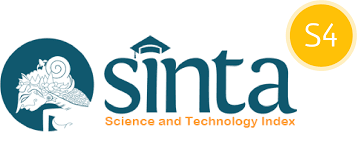Praktik Pedagogis Islam Rahmatan Lil ‘Alamin Melalui Program Pemberdayaan Keluarga Duafa
DOI:
https://doi.org/10.18196/jasika.v4i1.82Keywords:
Islamic Education, Pedagogical Practices, Islam Rahmatan lil 'alamin, Muhammadiyah higher education, radicalismAbstract
Islam rahmatan lil alamin is believed to be the key to success in shaping the personality and character of students and building the future of a multicultural civilization. Even though there are many studies that examine the importance of grounding the Islamic ideas of rahmatan lil Alamin in higher education, very few reveal the methods and pedagogical practices of Islamic rahmatan lil 'alamin even in Islamic tertiary institutions. This research aims to analyze innovative pedagogical practices in cultivating Islamic values rahmatan lil 'Alamin at Universitas Muhammadiyah Prof. Dr. Hamka (Uhamka), one of the Muhammadiyah Universities in Indonesia. Using qualitative methods, data was collected by means of content analysis of prepared reports and interviews with students. The results of the research show that through the empowerment program for poor families in the Muhammadiyah course, students learn to practice empathy, prosocial behavior, doing good, being useful, and giving love to others as the main values of Islam rahmatan lil 'alamin
References
Abdul Munir Mulkhan (2010), Kiai Ahmad Dahlan: Jejak Pembaruan Sosial dan Kemanusiaan , Jakarta: Kompas, p. 35.
Abdullah Sahin (2017), “Education as Compassionate Transformation: The Etical Heart of Islamic Pedagogy,” dalam Paul Gibbs, ed., The Pedagogy of Compassion at the Heart of Higher Education, Switzerland: Springer, p. 133.
Abdullah Sahin (2018), Critical Issues in Islamic Education Studies: Rethinking Islamic and Western Liberal Secular Values of Education,” Religion, Vol. 9, no. 11, p. 335.
Ai Fatimah Nur Fuad (2012), “Muslims in Britain: questioning Islamic and national identity,” Indonesian Journal of Islam and Muslim Societies, Vol 2, no. 2, pp.215-240.
Ai Fatimah Nur Fuad (2019), “Modernity and the Islamists Notion of Active Da’wa,” Afkaruna: Indonesian Interdisciplinary Journal of Islamic Studies, Vol 5, no. 2. pp. 187-202.
Amy L. Freedman (2009), “Civil Society, Moderate Islam, and Politics in Indonesia and Malaysia, “Journal of Civil Society, Vol 5, no. 2, pp. 107-127.
Asy-Syanqithi (2009), Tafsir Adhwa’ul Bayan: Tafsir Al-Qur’an dengan Al-Qur’an, Jakarta: Pustaka Azzam, Jilid 5, pp. 247-249.
Azaki Khoirudin, Zakiyuddin Baidhawy, and Mohd Roslan Mohd Nor (2020), “Exploring Muhammadiyah's Historical Civilizational Dimension Of Education In Indonesia: Pholosophy And Ethos of Humanitarian and Cosmopolitan,” Journal of Al-Tamaddun, Vol. 15, no.1, pp.183-197.
Azyumardi Azra (2014), Pendidikan Islam Tradisi dan Modernisasi di Tengah Tantangan Millenium III, Jakarta: Kencana, p. 5.
Bagong Suyanto, Mun’im Sirry & Rahma Sugihartati (2019), “Pseudo-Radicalism and the De-Radicalization of Educated Youth in Indonesia,” Studies in Conflict & Terrorism, Vol. 42, no. 2, pp. 153-172.
Clare Holdsworth & Georgina Brewis (2015), “Volunteering, choice and control: a case study of higher education student volunteering,” Journal of Youth Studies, Vol. 17, no. 2, pp. 204-219.
Clare Holdsworth (2010), “Why Volunteer? Understanding Motivations For Student Volunteering,” British Journal of Educational Studies, Vol. 58, no. 4, pp. 421-437.
David M. Bourchier (2019), “Two Decades of Ideological Contestation in Indonesia: From Democratic Cosmopolitanism to Religious Nationalism,” Journal of Contemporary Asia, Vol 49, no. 5, pp. 713-733.
Dina Afrianty (2021), “Islamic education and youth extremism in Indonesia,” Journal of Policing, Intelligence and Counter Terrorism, Vol .7, no. 2, pp. 134-146.
Elina Kuusisto, Laura Hirsto & Martin Ubani (2019), “Introduction to religions and world views creating purpose and meaning for learning,” Journal of Beliefs & Values, Vol. 40, no. 4, pp. 397-402.
Erick J. Kassel (2002), “Compassion,” dalam C.R. Synder, Shane J. Lopez (eds)., Handbook of Positive Psychology, Oxford: Oxford University Press, p. 439.
Gustav Brown (2019), “Civic Islam: Muhammadiyah, NU and the Organisational Logic of Consensus-making in Indonesia,” dalam Asian Studies Review, Vol. 43, no. 3, pp. 397-414.
Hadi Purnomo dan Umiarso (2018), “Sistem Pendidikan Islam Berwawasan Islam Rahmatan Lil Alamin: Kajian atas Gerakan Pendidikan Fethullah Gullen Movement,” Cendekia: Jurnal Kependidikan dan Kemasyarakatan, Vol. 16, no. 2, pp. 223-244.
Hamim Ilyas (2018), Fikih Akbar: Prinsip-Prinsip Islam Rahmatan Lil ‘Alamin, Jakarta: Pustaka Alvabet, p. 64
Hilman Latief (2016), “Philantropy and Muslim Citizenship in Post-Soeharto Indonesia,” Southeast Asian Studies, Vol. 5, no. 2, pp.269–286.
Ian MacMullen (2018), “Religious School, Civic Education, and Public Policy: A Framework for Evaluation and Decision,” Theory and Research in Education, Vol. 16, no. 2, pp. 1-21.
Imaduddin Abul Fida Ismail Ibnu Katsir (1985), Tafsirul Quranil ‘Adhim JIlid 3, Beirut: Alimul Kutub, pp. 201-2002.
Jaenuri (2019), “Sistem Pendidikan Islam dalam Kerangka Nasionalis-Religius Berbasis Rahmatan Lil ‘Alamin,” Matan: Jurnal of Islam and Muslim Society, Vol 1, no. 1, pp. 54-62.
Jeremy Menchik (2019), “Moderate Muslims and Democratic Breakdown in Indonesia,” Asian Studies Review, Vol. 43, no. 3, pp. 415-433.
Lawrence Lovat (2019), “Adressing Religious Extremism Through Theologically Informed Religious Education,” Journal of Religious Education, Vol. 67, pp. 103–114.
Mohd Roslan Mohd Nor and Maksum Malim (2004), “Revisiting Islamic Education: The Case of Indonesia,” Journal for Multicultural Education, Vol. 8, no. 4, pp. 261-276.
Muhammad Ali Ashabuni (1981), Mukhtashar Tafsir Ibnu Katsir, Beirut: Darul Qur’an al Karim, pp. 525.
Muhammad Fuad (2004), “Islam, Modernity and Muhammadiyah’s Educational Programme,” Inter-Asia Cultural Studies, Vol. 5, no. 3, pp. 400–414.
Muhammad Tamrin (2019), “Al-Islam dan Kemuhammadiyahan (AIK) Pilar Dakwah Islam Rahmatan lil ‘Alamin: Studi pada Perguruan Tinggi Muhammadiyah di NTT,” Ta’lim: Jurnal Studi Pendidikan Islam, Vol. 2, no.1, pp. 69-87.
Mun’im Sirry (2020), “Muslim Student Radicalism and Self-Deradicalization in Indonesia,” Islam and Christian–Muslim Relations, Vol. 31, no. 2, pp. 241-260.
Mun’im Sirry (2020), “Muslim Student Radicalism and Self-Deradicalization in Indonesia,” Islam and Christian–Muslim Relations, Vol. 31, no. 2, pp. 241-260
Nadeem A. Memon, Dylan Chown, and Claire Alkouatli (2021), “Descriptions and Enactments of Islamic Pedagogy: Reflections of Alumni from an Islamic Teacher Education Programme,” Pedagogy, Culture and Society, Vol. 29, no. 4, pp. 631-649.
Nigel Peter Michell Fancourt (2015), “Re-defining ‘learning about religion’ and ‘learning from religion’: a study of policy change,” British Journal of Religious Education, Vol. 37, no. 2, pp. 122-137.
Nurul Zainab (2020), “Rekonstruksi Kurikulum Pendidikan Agama Islam: Analisis Model Kurikulum Rahmatan Lil ‘Alamin,” Tadris: Jurnal Pendidikan Agama Islam, Vol. 15, no. 2, pp. 168-183.
Pedro Ortega Ruiz & Ramon Minguez Vallejos (1999), “The Role of Compassion in Moral Education,” Journal of Moral Education, Vol. 28, no. 1, pp. 5-17.
Rachael Diprose, Dave McRae & Vedi R. Hadiz (2019), “Two Decades of Reformasi in Indonesia: Its Illiberal Turn,” Journal of Contemporary Asia, Vol. 49, no. 5, pp. 691-712. 2.
Rachael Kessler (2000), The Soul of Education: Helping Students Find Connection, Compassion, and Character at School, Virginia: ASCD, p. 17.
Robert D Putnam (1995), “Bowling Alone: America’s Declining Social Capital,” Journal of Democracy, Vol. 6, no. 1, pp. 65-78.
Robert Kunzman (2005), “Religion, Politics and Civic Education,” Journal of Philosophy Education, Vol. 39, no. 2, pp. 159-168.
Stephen G. Parker (2021), “Children’s subjectivity and agency in religious education,” Journal of Beliefs & Values, Vol. 42, no. 3, pp. 277-278.
Zakiyah Darajat (2017), Muhammadiyah dan NU: Penjaga Moderatisme Islam di Indonesia,” Hayula: Indonesian Journal of Multidisciplinary Islamic Studies, Vol. 1, no. 1, pp. 79-94.
Zakiyuddin Baidhawy and Azaki Khoirudin, “The Core Ethos and the Progressive Spirit of Muhammadiyah Socio-Religious Movement,” Journal of Al-Tamaddun 13, no. 2, pp. 27-41.
Downloads
Published
How to Cite
Issue
Section
License
Copyright (c) 2024 Ilham Mundzir

This work is licensed under a Creative Commons Attribution-NonCommercial-ShareAlike 4.0 International License.




